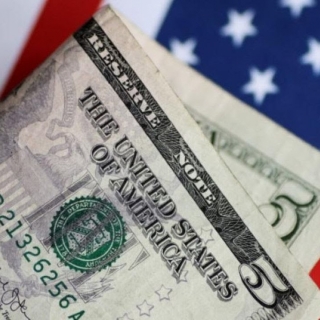


The dollar weakened on Monday as an early rally from a three-year low ended, with markets haunted by a series of tariff-related remarks from U.S. President Donald Trump that last week shook investor confidence in the world's reserve currency.
Investors were bracing for a tumultuous week as Trump's tariffs and then sudden delays on U.S. imports continued to stir confusion.
The dollar reversed early gains as Asian trading began, falling against the Swiss franc toward a 10-year low hit on Friday.
The dollar was last trading 0.05% lower against the Swiss franc at 0.8158.
The pound pared losses from earlier in the session, down just 0.06% to $1.3120. The New Zealand dollar rose to a four-month high of $0.5860. Trump said on Sunday he would announce tariffs on semiconductor imports over the next week, adding that there would be flexibility for some companies in the sector. The White House on Friday granted exemptions from high tariffs for smartphones, computers and certain other electronics mostly imported from China. Trump later said the move would be short-lived.
"At this point ... it's been handled in a haphazard, arbitrary and burdensome manner, and the measures have created a lot of uncertainty," said IG market analyst Tony Sycamore. "Those storm clouds, still swirling, haven't gone anywhere." Against the yen, the dollar fell 0.62% to 142.62. Japan is bracing for trade talks with the United States that are likely to touch on the thorny topic of currency policy, with some officials privately bracing for Washington to ask Tokyo to prop up the yen. Japanese Economy Minister Ryosei Akazawa said on Monday that foreign exchange issues would be handled by Finance Minister Katsunobu Kato and U.S. Treasury Secretary Scott Bessent.
"The market is moving quickly because it expects further yen strength after confirmation that Bessent and Kato will discuss foreign exchange," said Christopher Wong, a currency strategist at OCBC.
The euro rose 0.3% to $1.1396, near a three-year high hit on Friday as investors flocked to the common currency after a crisis of confidence in the dollar.
"I think we could see the euro trading at $1.20 by about ... late July, early August," IG's Sycamore said.
Growing nervousness among investors over U.S. asset holdings has caused some to dump those positions and move money into other markets including Europe, which has boosted the euro.
The Australian dollar was up 0.11% at $0.6301, extending its more than 4% gain last week.
Against a basket of currencies, the U.S. dollar fell 0.45% to 99.45, not far from a three-year low hit on Friday.
"The market is reassessing the structural appeal of the dollar as the world's global reserve currency and is undergoing a rapid de-dollarization process," George Saravelos, global head of FX research at Deutsche Bank, wrote in a client note.
"This is most evident in the ongoing and combined collapse in the U.S. currency and bond markets."
The massive sell-off in the U.S. Treasury market last week, driven in part by a quick halt in basis trading by hedge funds, was a major drag on the dollar.
There was no sign of a recovery in bonds on Monday with the 10-year yield at 4.47%, starting the week relatively steady after the biggest weekly rise in borrowing costs in decades. "We think the de-dollarization process has a long way to go, but we remain open-minded about how it plays out and what the ultimate new equilibrium in the global financial architecture will be," said Deutsche Bank's Saravelos. The onshore yuan fell 0.1% to 7.3022 per dollar, while the offshore currency fell more than 0.3% to 7.3059 per dollar. The offshore yuan hit a record low last week while the onshore currency slumped to its lowest level since 2007 as the trade war between the United States and China escalated. (Newsmaker23)
Source: Reuters
The USD/CHF pair weakened for the third consecutive day and traded around 0.7960 in early European trading on Tuesday. The Swiss franc strengthened on increased demand for safe haven assets, following...
The US Dollar Index (DXY) trended sluggishly around 99.06 on Monday (January 19th), as liquidity thinned as US markets were closed for Martin Luther King Jr. Day. Despite limited movement, global sent...
The US dollar is expected to rise for a third straight day on Thursday (January 8), but trading remains cautious as investors position themselves ahead of Friday's Nonfarm Payrolls (NFP) report. Recen...
The dollar index edged up to 98.5 on Tuesday, its strongest level in more than two weeks, as investors focused on a slate of key economic data for the US. Recent indicators have pointed to some soften...
The US dollar opened 2026 weakly on Friday. Throughout last year, the dollar was pressured by many major currencies due to narrowing interest rate differentials between the US and other countries. Con...
Oil prices stabilized on Thursday (February 12th), as the market reassigned a risk premium to US-Iran tensions despite US inventory data showing swelling domestic supplies. This movement confirms one thing: geopolitical headlines are still more...
Gold prices weakened slightly on Thursday (February 12th), as more solid US employment data reduced market confidence in an imminent Federal Reserve interest rate cut. The strong employment data prompted market participants to shift expectations of...
The Hang Seng Index reversed its downward trend in Hong Kong on Thursday (February 12th), weakening by around 0.9% to around 27,000 after a strong session earlier. This decline halted the momentum of the short term rally, as investors began to...